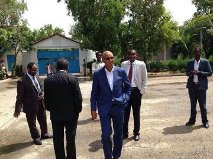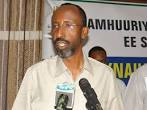By Omar A. Hashi
Somalia is unfortunately caught up in yet another ‘political crisis’. The tumultuous events of the last few weeks in Mogadishu have greatly destabilized the political process unnerving regional and international partners of Somalia that finance the embryonic government in Mogadishu. Somalia is a nation emerging from 23 years of civil strife and as such the tenacity of its infant institutions are severely limited. The country is desperate for wounds to heal and a process of reconciliation to flourish.
The first administration formed in this current political cycle made somewhat of a sluggish progress in that direction, and came to be seen as a government entangled in conflict outwardly in opposition to regional states and inwardly too within the first year.
 Less than 12 months ago exactly, a similar conflict ensued at the heart of the government. The President clashed with Prime Minister Abdi Farah Shirdon (Saacid) whom he accused of being weak and ineffective. Parliament was utilised to dissolve the government through a Vote of Confidence, and a secondary process of building a government followed. Some months prior to this event, Al-Shabab attacked Parliament and launched a daring assault into Villa Somalia, murdering the Permanent Secretary of the Prime Minister’s office in the process along with dozens of officials.
Less than 12 months ago exactly, a similar conflict ensued at the heart of the government. The President clashed with Prime Minister Abdi Farah Shirdon (Saacid) whom he accused of being weak and ineffective. Parliament was utilised to dissolve the government through a Vote of Confidence, and a secondary process of building a government followed. Some months prior to this event, Al-Shabab attacked Parliament and launched a daring assault into Villa Somalia, murdering the Permanent Secretary of the Prime Minister’s office in the process along with dozens of officials.
A new Prime Minister was appointed in December 2013, who then selected a cabinet to lead the affairs of government. A casual survey since then shows the government made some strides in restoring security to South Central Somalia. Al-Shabab’s leader and chief ideologue Ahmed Godane was assassinated in a US strike in the summer. The combined forces of the African Union troops and the Somali National Army are dislodging various pockets of Al-Shabab resistance from Bu’ale to Barawe.
Relations are slowly normalizing between the Federal Government and the regions as evidenced by the recent agreements with Jubbaland and Puntland, as well as facilitating progress in the nascent South West administration, while certain steps have been taken towards the formation of a Central State; all are signs of steps being taken in the right direction. So what went wrong? Twelve months later, why are we facing the process of a second Prime Minister being ousted in a little over a year?
The President and his team have often failed to play by the rules as stipulated in the Constitution. The Constitutional process of 2011-12 calls for the Prime Minister as the Head of Government. Should the President feels aggrieved about the stipulations of the contract, the correct procedures to follow would have been the establishment of a Constitutional Review Committee and address grievances through legitimate processes.
Continually waiving the Constitution aside fundamentally undermines the legitimacy of the government and the efforts invested in state building since 2004. How could the ordinary citizen be held accountable to the law when the highest office in the land continually disregards Constitutional Processes and views legality as mere nuisance to be side stepped at convenience? Throwing away the limited progress made by pressing the reset button does a great disservice to the Somali people. The options going forward for Somalia’s partners in current thinking paradigms are as follows:
1- Support the on-going processes and progress in the country through mediation between President and Prime Minister, while reminding the President of the Constitutional responsibilities assigned to each executive office in the country, so as to avoid further spats caused by one office overreaching beyond its Constitutional mandate, or;
2- Look the other way implicitly licensing the use of Parliamentarians as factional ‘spoilers’ who will topple the government of the day through illicit means. A similar tactic would be one where Minister’s allied to the President are financially induced to threaten collective resignation, and in doing so, force the Prime Minister’s hand thus toppling the government.
This will lead to the following:
3- The Prime Minister and this administration are deposed, and a new process to be underway. A new Prime Minister will be named within 30 days; the new PM will take a further 30 days to name a cabinet. The whole furore takes about 4 months to resolve. The incoming Prime Minister and his team will go through a probationary period of 3 months at the very least whilst they review the progress of government and present their policy programs. In total, the year 2015 will be wasted as the new government comes to grips with the machinery of government.
The second option will prove extremely costly to the country, as the political process will stall at a critical time, merely a year away from 2016 and general elections in the country. A further option must now be presented for consideration:
4- Review the position of the President directly. The factional and micromanagerial
style employed since 2012 by the President has proved to be extremely divisive. The unpleasant scenes in parliament last week unfolded as a result of Vote on a motion of confidence being employed against Prime Minister and Cabinet, Parliament has not been this divided since 2011. This is a forecast of what’s to come; further division, instability, and the demolition of governments for not being acquiescent enough by the State House.
A possibility that has not been considered which perhaps should is to evaluate
whether an ‘Interim Administration’ would better serve the interests of the country. An interim government of ‘National Unity’ could be formed with a mandate of focusing on limited policies as follows:
1- National Reconciliation
2- Completing the Interim Constitution and regional State’s building processes.
3- Preparing the country for elections scheduled for 2016.
To some this inconceivable because they consider the Presidency as ‘too big to fail’, but a distinction needs to be made between a President and the Presidency. Conflating the two is a critical and dangerous mistake. There is a precedent for this; President Abdullahi Yusuf resigned in January 2009 after a similar conflict paralysed his government. If a new interim administration is formed, the new President will assume the mantle of the Presidency and the institution will continue to function unscathed.
The pros in this option are that a more reconciliatory figure as President untainted by allegations of corruption and misappropriating funds has a better chance to lead the country, as opposed to a President whose close allies stand accused of selling arms to Al Shabab, in addition to factional allegations which continue to linger and haunt the State House.
A new President who adheres to his role as Head of State, and grants his Prime Minister and Cabinet of ‘national unity’ the space to rebuild the wrecked institutions and guide the policy direction of the country starting with the National Army would better serve the reconciliation process across the country. A further advantage is that a new government will automatically receive the goodwill of the Somali people and present a fresh start towards 2016.
 If the status quo continues, the Somali people would be well within their rights to question the resolve and the collective wisdom of the international community, which is now an active participant in the Somali political space through AMISOM and the various agencies that support the Somali State.
If the status quo continues, the Somali people would be well within their rights to question the resolve and the collective wisdom of the international community, which is now an active participant in the Somali political space through AMISOM and the various agencies that support the Somali State.
The Somali State is the real ‘too big to fail’ setup here. If the President insists that his political allies namely the former Minister of Justice Farah Abdulkadir are above the Constitution, then the inertia and lack of will by the International Community would result in the denigration of the nascent Federal Government and institutions, giving credence to spoilers including Al-Shabab and their villainous allies. The parliament itself is at a major risk for being split and fragmented.
The best of all these options is that mediation is achieved between President and Prime Minister either directly or indirectly. The worst is haplessly watching another government being toppled with the expectation that the next government will also be toppled. The next 12 months are wasted while we wait and countdown that inevitable soiree at this very same junction by next Christmas. If this is the case, then there is little to no hance of the country being readied for elections in 2016, and the President’s term will need to be extended, well into 2018 perhaps. There are no guarantees the President will not have another fall-out with the next Prime Minister and the process may well be repeated all over again in 2015.
Can the Somali people who have suffered over the last 23 years afford further chaos and instability? What will happen to the process which was supposed to culminate with elections in 2016? Will spoilers be permitted to disrupt these processes and in doing so, the country isn’t readied for elections by 2016?
These are the hard questions that policy formulators in Washington, London and Brussels face. Feeling helpless and paralysed won’t deliver the future of the Somali state or promote regional security and stability, being decisive will.
Omar A. Hashi
Email::omar.hashi@yahoo.com

Leave a Reply